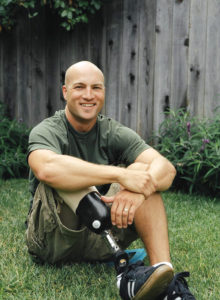By Elizabeth Bokfi
“With treatment, you have a 50/50 chance of survival past three years.”
Such words can pack a stronger punch than a Starbucks extra-dark roast triple-triple. When I first heard them in 2007, I discovered that having the will to survive and consciously making the decision to survive are two very different, yet closely intertwined, things.
That was the first of several defining moments during my tumor and amputation journey when my will to survive kicked in. I decided then that I’d be among the 50 percent who survived—a conscious decision to survive, fueled by a will to survive.
Following the first of six prescribed cycles of deadly chemotherapy cocktails that I received, I was sickly and unable to eat; my family urged me to discontinue treatment. I struggled with the decision. I wanted to live. I obsessed about that “50/50 chance of survival” bit, yet, somehow, I believed it was the cure that would “get” me. Oscillating between fear and confidence, while attempting to control my rampant fear of death, I made the difficult, intensely personal decision to abandon chemotherapy. I believe this is why I survived. —Author’s account.

Chad Crittenden, Cancer, and Survivor
Although the means of surviving vary, knowing how others have done it can help us on our own journey.
For 49-year-old Chad Crittenden of Livermore, California, a survivor of synovial sarcoma, his will to survive was augmented by a strong family support system and the desire to see his then 1-year-old daughter grow into adulthood. In 2004, having his right leg amputated due to a tumor wasn’t something Crittenden anticipated, but it was something that later would open the door to being a survivor of a different sort.
“After my surgery and subsequent recovery, and doing a sprint distance triathlon, I knew I was back to an active, athletic lifestyle. My wife and I had always watched [the CBS series] Survivor, and when I saw [they were] looking for new contestants…, it struck me. I also knew at this point they needed something new and different for Season 9. [An amputee] contestant would be the ideal hook, a compelling new angle for something viewers had never seen. I was very confident this was going to get me on the show. It did!”
Crittenden’s casting for Survivor: Vanuatu–Islands of Fire was an exercise in tolerance as he strived to survive the weeks leading to his acceptance for the role—weeks of being sequestered in a hotel room, interviews, and vetting by CBS producers and casting directors.
Crittenden on His Survivor Experience
During the show, wearing a prosthesis presented unique challenges, including volume changes due to weight loss and pistoning inside the socket, which can cause friction and skin breakdown.
“I knew I needed to gain weight before going on, as all contestants lose a huge percentage of their body weight as they are expending thousands of calories and not eating. I gained weight and tried staying in good shape…. I [then] lost about 15 pounds in 29 days.”
During water challenges, keeping water out of his prosthesis was another concern.
“I used a silicone tubular-type sleeve to go over my suspension sleeve, using Velcro straps…. It worked okay to minimize the water and sand getting into everything. I could take my foot apart…and wash it off in fresh water. There was a small creek there.”
…on Himself
“I learned the limits of my physical capabilities…. Suffering is part of [each] day—all day and night getting wet and not always being able to fully dry out, being cold, sleep deprivation, constant hunger, dehydration—not to mention my leg…. My Survivor experience and my overcoming challenges as an amputee go hand in hand. One helps the other and vice versa.”
…on Chemotherapy
“I was given the option of chemotherapy; however, with synovial sarcoma, there is no definitive research to show that chemo helps. So, I opted not to get chemo. I have always had a very robust immune system, so I relied on that.”
…on Survival
“Regarding facing mortality, the thing that pulled me along the most was envisioning my future. I had always had a very clear image in my mind’s eye of having children—being a dad—having a life of family and happiness. Although I had fleeting thoughts of the worst-case scenario—my own death—those were short-lived. I didn’t even draw up a will or make any preparations for the worst. [I] put my energy, focus, and mindset toward the future and toward thriving. A giant carrot on the end of the stick was my 1-year-old daughter and knowing that I would be with her, raising her, and seeing her and her future sibling grow up.”
…after Survivor
Although Crittenden continues to present motivational sessions, after 14-plus years of motivational speaking and consulting, he’s returned to his roots as a teacher. He’s a lead-by-example sort of guy when it comes to surviving a classroom full of third-graders. A case of survival of the fittest, in real time.



